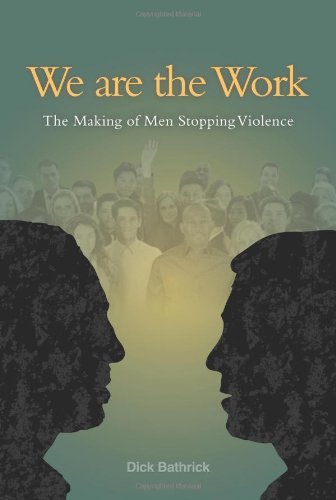We Are The Work: The Making of Men Stopping Violence, a new book by therapist and long-time activist Dick Bathrick, chronicles the 30-year legacy of Men Stopping Violence, an organization that has worked tirelessly to end violence against women by engaging the population largely responsible for that violence -- men.
Started in 1980, Men Stopping Violence came into being when few people were viewing violence against women as a problem of men. It was -- and in many places still is -- seen as something that is a "women's issue," despite the fact that research shows men are largely the perpetuators. Over the years, MSV's work has had a significant cultural impact on how we understand gender-based violence, influencing everything from mainstream media to government agencies.
In recognition of National Sexual Assault Month, a call to awareness on all forms of sexual assault and violence, I reached out to Dick to talk to him about We Are The Work, the legacy of MSV, and why it is important that this book reaches men who are dedicated to ending violence.
Akili: What does the title We Are The Work mean?
Bathrick: 'We are the work' means that no matter where or when you enter the struggle to end violence, you have to start and stay with examining yourself. You have to identify both your strengths and the places you need to grow. And it's not about whether or how you transcend those personal challenges, It's that you have to know that they're there and how you will address them. This book tells the stories that illuminate those personal and institutional challenges.
Akili: How have you seen the conversation on violence shift since MSV was founded?
Bathrick:I think that one of the ways that the discourse has shifted is to recognize that focusing on fixing the "bad" men who get caught for injuring women is too little too late. Now there's a growing emphasis on engaging with all men in our communities, because misogyny resides not in individual men but in the sociopolitical climate that produces and sustains men's disrespect of women.
Akili: What has Men Stopping Violence been doing exactly for 30 years to address male violence?
Bathrick: For 30 years MSV has held the mirror up to communities, which says violence against women will stop when each one of you makes that happen. Typically over the years people would come to MSV for us to "fix" men. While we have always held classes where men can work to change their controlling and abusive behaviors, our priority has been to provide trainings for faith, medical, business and higher education communities -- as well as all facets of the criminal legal system -- on how those communities and systems can work together to hold men accountable while promoting safety and justice.
Akili: Why did Men Stopping Violence decide to focus on men?
Bathrick:Women will call on family, friends, the police, the pope, god herself to get men to stop violating women. But men will stop when we decide to stop. And we will decide to stop when we believe that the communities in which we reside -- and particularly the men in those communities, those with position, social location and power -- send a clear and consistent message that violence against women will not be tolerated. And when it happens, it will be met with swift and meaningful consequences. MSV sees it as our responsibility to educate and mobilize those men.
Akili: What does this book reveal about men, and our capacity to end violence? Or even more so, change our behavior?
Bathrick:This book reveals that when we (in our respective communities) expect more of men , especially regarding their capacity to participate/promote safe and equitable relationships, men will deliver. And when we set the bar low, and make excuses that tacitly and explicitly condone men's disrespectful, abusive and controlling behaviors, men will go low.
Akili: Why do or men of all ages need to read this book? What can they learn about themselves?
Bathrick: The lessons learned in this book are the lessons that we share with men in our classes, and with men and women in our trainings. And one of the most oft repeated statements by men in our classes is "I wish I had taken this course;" or "received this basic information on how to relate to women and other important people in my life when I was a young man, if not when I was a boy;" or "Why did I have to injure and devastate the people I love most in order to get myself in the place where I can learn how to be the man they need me to be?" My hope is the lessons they are speaking of will be useful to the men and boys who read this book.
Akili:What has the experience of writing this book taught you?
Bathrick: Personally I learned a lot from the challenge to find and express my authentic voice on paper. I was motivated to write the book by my hope and belief that the lessons we learned could be useful to others who participate in or are just interested in social justice work. I'm particularly excited by the numbers of young men and women who are engaging in social justice work... all over the world. And while I hope this book will be instructive for them, I know that we "movement'' veterans have much to learn from them. So another hope of mine is that this book will facilitate that intergenerational conversation. While this is a memoir of the history of MSV, I share some personal anecdotes to illustrate some points. Not surprising since, I too, am the work.
We Are The Work: The Making of Men Stoping Violence, published by Trafford Books, is available on Amazon.com and wherever books are sold.
Need help? In the U.S., call 1-800-799-SAFE (7233) for the National Domestic Violence Hotline.

